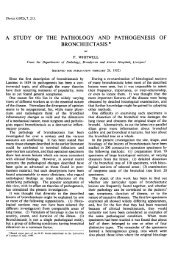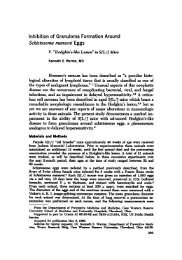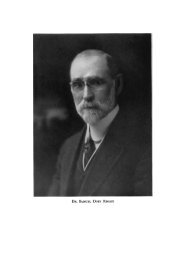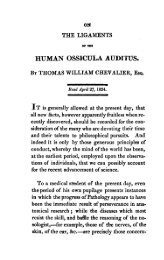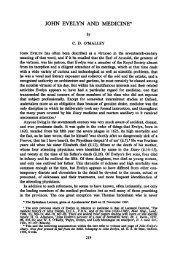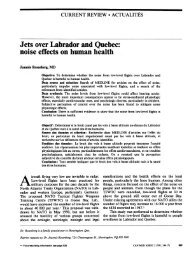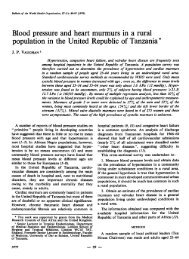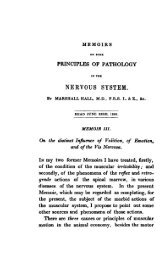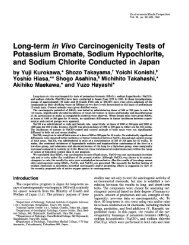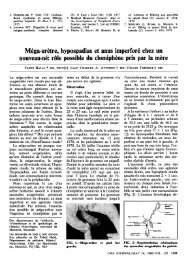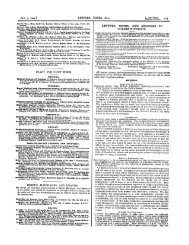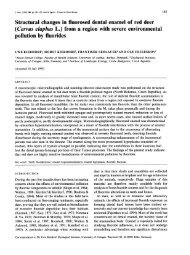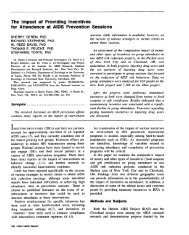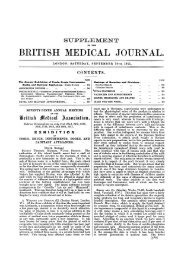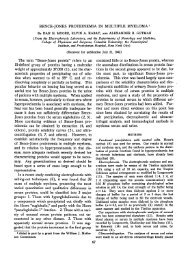MEDICAL, SURGICAL, OBSTETRICAL. - Europe PubMed Central
MEDICAL, SURGICAL, OBSTETRICAL. - Europe PubMed Central
MEDICAL, SURGICAL, OBSTETRICAL. - Europe PubMed Central
Create successful ePaper yourself
Turn your PDF publications into a flip-book with our unique Google optimized e-Paper software.
880 ST R Sn MEMORANDA. tAPRIL 26, 1913.<br />
If an injection of adrenalin be made just before an<br />
anaesthetic is given, no bad results occur. It is difficult<br />
to understand the fact that when chloroform anaesthesia<br />
is deep the danger of injecting adrenalin is less than<br />
when light; unfortunately, in those operations in which<br />
adrenalin is most often used for haemostatic purposesthose<br />
about the nose and throat-it is a light anaesthesia<br />
that is desirable, and the anaesthetic chosen is usually<br />
chloroform.<br />
<strong>MEDICAL</strong>, <strong>SURGICAL</strong>, <strong>OBSTETRICAL</strong>.<br />
LONG INTERVAL BETWEEN BIRTH OF TWINS.<br />
A SOMEWHAT unusual case of twins occurred in the practice<br />
of Dr. Macklin and myself, and seems of sufficient interest<br />
to record.<br />
A multipara had a living male child on February 24th,<br />
the labour being quite straightforward. Another child<br />
could be felt with the vertex on the left and the child's<br />
back to the mother's left front. She had severe afterpains<br />
at half -hourly intervals for ten hours, and after that<br />
at longer intervals, until they ceased in twenty-four hours<br />
after the birth of the first child. The locllia was almost<br />
absent. She was allowed up at the end of a fortnight,<br />
and went about performing her household duties until<br />
April 4th, when labour pains came on again and she was<br />
delivered of a living female child. The first child weighed<br />
6 lb. and the second 61 lb., both being small but well<br />
nourished, and both are doing well now.<br />
The point of interest is the long interval between the<br />
two births, nearly six weeks, and the fact that thougLh th-e<br />
pains after the birth of the first child were strong and<br />
fairly frequent they failed to dislodge the second.<br />
Slhe has had four other children, single births, and one<br />
miscarriage.<br />
Whalley. J. M. POSTLETHWAITE.<br />
STRANGULATED HERNIA IN AN INFANT.<br />
THE cases recorded last November by Dr. Nichols and<br />
Mr. Dent induce me to record a case that occurred in my<br />
own practice some two years ago.<br />
The patient was an infant aged 6 weeks at the Jenny<br />
Lind Children's Hospital, and I was summoned to it late<br />
one evening because the hernia-one of the strangulated<br />
inguinal variety-had resisted all attempts at reduction.<br />
Chloroform having been administered, I found that tlle<br />
gut could not be reduced by gentle taxis, and as previous<br />
attempts had been made, I operated at once. On openingthe<br />
sac, about a teaspoonful of turbid serum escaped. The bowel<br />
was intensely injected and of a purple colour. The neck of<br />
the sac being divided, the gut was easily reduced, and the<br />
opportunity was taken to do a radical cure, two buried<br />
sutures being used. Tlle child made a good recovery.<br />
I had never previously seen a case of strangulation in so<br />
young an infant. During nearly twenty years' work on<br />
the staff of the Children's Hospital here I had never seen a<br />
case of strangulated hernia in so young an infant, nor did I<br />
while house-surgeon at the Manchester Clhildren's Hospital<br />
under Professor G. A. Wright. The latter in hiis book<br />
Di8eases of Children (Ashby and Wriglht) does, however,<br />
mention cases as young as 3 weeks (Halsewood) and<br />
4 weeks (Maunder), and Mr. lRushton Parker, in the<br />
BRITISH <strong>MEDICAL</strong> JOURNAL of October 26th, 1912, quoting<br />
from Mr. Howard Marsh's article, gives cases as young as<br />
8 days and upwards to 13 years.<br />
I note that Mr. Parker, in his case of an infant 28 days<br />
old, used the original strict Listerian dressing, which<br />
I also adopted in my case, deeming it safer, but lhave<br />
latterly regularly used the " open " method of Mr. Stilesthat<br />
is, no dressings. I have never punctured the scrotal<br />
swelling, as Mr. Parker did, althouah I hhave on several<br />
occasions thouglht of doing so, the swelling having<br />
eventually subsided. HENRY C. NANCE, F.R.C.S.Eng.,<br />
Consulting Surgeon, Jenny Lind Hospital for<br />
Norwich. Sick Children.<br />
SUGGESTED OPERATION FOR RELIEF OF<br />
PROSTATIC HYPERTROPHY.<br />
A CORRESPONDENT (p. 804) has raised a point wlhich has<br />
interested me much during the last few years, altlhough<br />
I have not had the opportunity to put it to a practical<br />
test.<br />
In 1900 I devised and practised an operation for tle<br />
cure of cystocele in the femuale, which is mentioned in<br />
Dr. Inglis Parsons's book on the treatment of Uterine<br />
Prolapse (page 52). I have since performed the operation<br />
in many cases, and always with success.<br />
The results have been so good that I have often wished<br />
to put to the test the effect of a similar operation in au<br />
early case of enlargement of the prostate gland. The conditions<br />
are very similar, for how much of the abnormal<br />
growtlh of the prostate may be due to the infiltration of its<br />
substance from the decomposing urine in the residual sac<br />
which lies behind and below it? Could an arrest be<br />
effected by the obliteration of this sac and its load of<br />
bacteria ?<br />
The operation for cystocele in the female is simple and<br />
safe. The recti are divided in the middle line until tlhe<br />
distended bladder is exposed, as in the suprapubic operation<br />
for calculus. The finger is then gently swept round<br />
the upper surface of the bladder, and detaches it from its<br />
abdominal relations until the upper surface of the distended<br />
bladder is freed. The contents of the bladder are<br />
then allowed to escape, and the loose upper part is drawn<br />
down and puclkered with a stitch which is lightly tied, the<br />
ends being left long. Each long end is threaded in a<br />
needle, and is passed through its corresponding rectus as<br />
near as possible to its insertion on the pubis, and is then<br />
made to serve in closing the lower end of the divided<br />
muscles. Other stitches close the upper part of the musclo<br />
and the skin wound. For some days afterwards thle urine<br />
is drawn off by the catheter every three hours. At the<br />
end of a fortnight it will be found that the residual urine<br />
is almost nil. I distend the bladder with a boric acid<br />
solution, and give an assistant the charge of the meatuLs<br />
urinarius, wlhich he controls with his finger until he is told<br />
to release it, after the upper portion of the bladder has<br />
been freed from its former site.<br />
It would be more easy to control the escape of the fluid<br />
used to distend the bladder in the male.<br />
Guernsey.<br />
J. AixmAN, M.D., C.M.Glasg.<br />
A BIMANUAL METHOD OF RECTIFYING A<br />
FACE PRESENTATION.<br />
ON March 11th I was called to a woman in labour with<br />
her fourth child. Previous labours had been difficult, the<br />
pelvis being small and the children rather large.<br />
The face was presenting, the chin being left anterior.<br />
The membranes were ruptured and the os uteri partly<br />
dilated, but though the face had just engaged the brim,<br />
the head was not coming down into the pelvis. It seemed<br />
quite obviously a case for podalic version as recommended<br />
by the books. As, however, the nearest help was five<br />
miles away and I did not at all relish the prospect of<br />
failing to deliver an after-coming head, I decided first<br />
to make what effort I could to turn the presentation into<br />
a vertex.<br />
The patient being in the left lateral position across the<br />
bed, I inserted the left hand into the uterus, grasped tlhe<br />
head, and rotated the chin well to the right so as to bring<br />
the occiput to the left, in order to enable me to make uso<br />
of both hands to advantage. The left thumb was then<br />
pressed upwards -on the clhin, and with the fingers hooked<br />
over the occiput I tried to draw it down; the palm steadied<br />
the head, whilst with the right fist pressure was made<br />
downwards on the occiput through the abdominal wall.<br />
The manoeuvre proved quite successful, adequate flexion<br />
being quickly. secured. The occiput was thcn rotated back<br />
again and round to the front, the blades of the forceps<br />
were accurately adjusted to tlle sides of the head, and<br />
delivery was effected after much pulling.<br />
I am quite satisfied that I should have found very much<br />
greater difficulty if I had performed version, and I shlall<br />
not hesitate to use this method of rectification again if<br />
and when occasion serves.<br />
Harston, Camlbridge. Wv. J. YOUNG, M.R.C.S., L.R.C.P.
.- 14mtLJORA] UNIVERSITIES AND COLLEGES. [APRIL 26, r1r3.<br />
,:Jfi b,erbicez..<br />
ROYAL NAVAL <strong>MEDICAL</strong> SERVICE.<br />
SURGEON-GENERL SIR JAMES PORTER, K.C.B., has been<br />
awarded -the Good Service Pension of £100 per annum vacant<br />
by the death of Inspector-General of Hospitals and Fleets<br />
John Fisher.<br />
By anOrdenying Pay.<br />
By an Order in Council, published in the London Gazette of<br />
April 18th, the following arrangements have been sanctioned:<br />
(1) Medical officers who obtain the certificates of the Royal<br />
Aero Club at their own expense to be eligible for gratuity of<br />
£75, provided the permission of the Admiralty to undergo such<br />
training has first been obtained. (2) Medical officers trained at<br />
the <strong>Central</strong> Flying School, or at a naval flying school, to be<br />
paid half the authorized rate of flying pay while under instruction.<br />
(3) After attaining such standard of proflciency as may<br />
be laid7down, medical officers to be paid the authorized rate of<br />
flying pay (a) for any days on which they may be required to<br />
fly on auty, (b) for days on which it may be necessary for them<br />
to carry out practice flights not exceeding two days per month.<br />
THE INDIAN <strong>MEDICAL</strong> SERVICE.<br />
,THE Gazette of India of February 15th, 1913, notifies that<br />
Colonel G. W. P. Dennys, Inspector-General of Hospitals<br />
in the <strong>Central</strong> Provinces, is granted leave for eight months,<br />
and that Lieutenant-Colonel H. E. Banatvala acts in his<br />
place.' This announcement is of interest as being the promotion<br />
of an Indian member- of the I.M.S. to officiate in<br />
the administrative grade and as Principal Medical Officer<br />
of an Indian province. No Indian has yet attained permanently<br />
to such a post, but one, Lieutenant-Colonel E. P.<br />
Frenchman, C.I.E., acted in the same office, in Burma, in<br />
1909.<br />
It was a strict rule of the East India Company that only<br />
men of pure <strong>Europe</strong>an extraction- should be appointed to<br />
the I.M.S. The India Act of 1853, Acts xvi and xvii Vict.,<br />
cap. 95, introduced competitiv'e examination, 'open to all<br />
natural-born subjects of Her Majesty, for admission to the<br />
service. The first examination was held in January, 1855,<br />
-when the list was headed by S. C. G. Chuckerbutty,<br />
a Bengali Christian, who had'been one of the 'Indian<br />
students sent to study in England, under the guardianship<br />
of Dr. H. H. Goodeve, ten years before. Chuckerbutty took<br />
the diploma of M.R.C.S. in 1848', the degree of' M.D.Lond.<br />
in 1849. From 1850 to 1854 he served in the Uncovenanted<br />
Medical Service. Of the five students sent home with<br />
Goodeve, Chuckerbutty was the only one who was young<br />
enough, in 1855, to enter for the examination for the<br />
I.M.S.<br />
Since 1855 over 100 men with pure Indian names have'<br />
gained admission to the I.M.S.,of whom nearly-forty-nine<br />
have joined on the General List instituted in 1896.- Some<br />
twenty others, with Portuguese or Arihenian surnames,<br />
have also entered; as well as a considerable number of<br />
Anglo-Indians of mixed blood, who, of course, cannot be<br />
identified by their surnames.<br />
It is not perhaps surprising that no Indian has yet risen<br />
permanently to the administrative rank. More than half<br />
of the Indians admitted are still too junior for any question<br />
of their promotion to have arisen. Of the'seniors,- comparatively<br />
few, only some ten' in' all, have put- in the full<br />
thirty years' service necessary for pro'motion or full pension.<br />
Many have taken the first opportunity of retiring as<br />
soon as they had earned the flrst pension. Several have<br />
held appointments of importance with credit and success.<br />
Chuckerbutty became professor of materia medica in the<br />
dalcutta Medical College, and second physician of the<br />
College Hospital, in 1864, and held the post till his death,<br />
when on leave, in London, on September 29th, 1874.<br />
Another Indian, R. C. Chandra, was his successor in these<br />
offices, and held them for nearly twenty years, till his<br />
retirement on October 16th, 1891. Lieutenant-Colonel<br />
Frenchman for several years held the Inspector Generalship<br />
of Prisons in B~urma. Another Indian officer held<br />
that post in the province of Eastern Bengal and Assam,<br />
and now holds it in the new province of Bihar and Orissa.<br />
Ten have risen to the rank of brigade surgeon, or its modern<br />
equivalent, lieutenant-colonel, on the selected list.<br />
Lieutenant-Colonel Hormusjee Eduljee Banatvala is a<br />
Parsi by birth. He was born on October 20th, 1859, so has<br />
a year and a half yet to run before attaining th'e age for<br />
compulsory retirement. He was educated at the Grant<br />
W edical College, Bombay, where he took the L.M. and S.<br />
fn1881, and at St. Bartholomew's Hospital, taking the<br />
'M.R.C.S., L.R.C.P.Ljond;, and tj.S3.A. 1n 1882. He entered<br />
the Bombay Medical Service adsuglrgeon on April 1st, 1884,<br />
passing third, and a few months later was transferred to<br />
Bengal, became surgeon-major on April 1st, 1896, lieutenantcolonel<br />
on April Ist, 1904, and wars placed on the selected<br />
list on January 1st, 1910. For the first nine years he<br />
remained in military employ, serving in Burma from 1886<br />
to 1889, when he took part in the operations of the First<br />
Brigade and in the pursuit of Hla Oo; he received the<br />
medal with two clasps. He also served in the Lushai<br />
expedition of 1892. For the last twenty years he has been<br />
in civil employ in the <strong>Central</strong> Provinces, where he now<br />
becomes Acting Inspector General of Hospitals.<br />
GLASGOW UNITS, ROYAL ARMY <strong>MEDICAL</strong> CORPS. i<br />
THE annual gathering and presentation of prizes in connexion<br />
with the Glasgow units of the Royal Army Medical Corps<br />
Tferritorial) took place in the new head quarters at Yorkhll<br />
Parade. I.ieutenant-Colonel A. D. Moffat, M.D., Commanding<br />
the 2nd Lowland Field Ambulance, presided, and there were<br />
also present Colonel D. J. Mackintosh, M.B., M.V.O., Assistant<br />
Director- of Medical Services, Iowland Division; Lieutenant-<br />
Colonel H. Wright Thomson, LIavlnd Mounted Brigade Field<br />
Ambulance; Lieutenant-Colonel George H. Edington, M.D.,<br />
1st Lowland-Field Ambulance; Lieutenant-Colonel A. G. Hay,<br />
M.D., 3rd S,ottish Hospital ;- Colonel Alexander Napier, M.D.,<br />
4th Scottish Hospital- and oth-ers.; The chairman said that the<br />
'aggregate authorized, strength of the units was 32 officers and<br />
730 other ranks, and that there were serving on February 28th<br />
29 officers and 743 other ranks.: Since then the shortage of<br />
officers had been made good, and he congratulated those present<br />
on being members of a bighly prosperous and admirably<br />
equipped-corps.' So far as the crisis in the Territorial Force<br />
"was concerned they had no knowledge of it in the Glasgow<br />
units of the Royal Army Medical Corps. Colonel Mackintosh<br />
presented the prizes gained- during the past season, and congritulated'-<br />
Colonel Moffat on the excellent report. He was<br />
'glad' to learn that a large number of men propsed to re-engage<br />
for a further period, which showed their patriotism and their<br />
loyalty to the Territorial Force.<br />
?itiber6itiz, atob oT!ft#tHZ.<br />
UNIVERSITY OF LONDON.<br />
Graham Scholarship in Pathology.<br />
THE late Dr. Charles Graham, Professor, and later Emeritus<br />
Professor of--Chemiical Technology in University College, by<br />
his will bequeathed the residue of his estate to the University<br />
of London,to-fond at the School of Advanced Medical Studies<br />
of University College a Charles Graham Medical Research<br />
Fund. The Senate was empowered to establish a Graham<br />
scholarship -in--pathology of not more than £200 a year to<br />
enable a young man to continue his pathological researches,<br />
while at the same time he gives his services to the school as a<br />
teacher under the Director of Research appointed under the<br />
Grabam bequest. The Senate now invites applications for the<br />
Graham scholarship in pathology, which is of the value of £200<br />
per annum for two years. ..Applications stating the research<br />
upon which the applicant -proposes to work, and marked<br />
"Graham Scholarship," must be sent to the Principal, University<br />
of London, South Kensington, S.W., by May 31st, accompanied<br />
by tho Iames of not more than three references, one at<br />
least of which should be the name of a professor, lecturer, or<br />
teacher of-the university or'college in which the candidate<br />
has conducted his studies in pathology.<br />
CONJOINT BOARD IN ENGLAND.<br />
THE following candidates have been approved at the examina,<br />
tion indicated:<br />
FIRST COLLEGE (Part IV, Practical Pharmacy).-C. H. B. Avarne,<br />
A. J. Bado, 0. Baier, P. W. Barnden, C. A. Bernard, J. W.<br />
Bouwer, H. H. Castle, A. J. Chillingworth, G. D. Compston,<br />
D. T. Corke, H. L. Cronk, F. W. Crook, J. D. L. Currie, G.<br />
Dayal, S. B. Depree, B. Donaldson, K. M. K. Duff, P. Green,<br />
H. S. Groves, H. Gwynne-Jones, W. T. Gwynne-Jones, A. R.<br />
Hacker, T. W. Hancock, T. C. Higgins, G. G. B. Holroyde, T. R.<br />
Kenworthy, G. H. S. Letchworth. A. R. Muir, W. E.<br />
F. A. M. Nelson,<br />
Neale,<br />
D. W. Pailthorpe, A. B. Preston, F. N. Reynolds,<br />
A. N. Rushworth. T. W. Sheldon, A. H. Taymour, G. O'N.<br />
Waddington, L. M. Waldron, A. S. Westmorland, G. W.<br />
Wheldon, L. H. Woods.<br />
CONJOINT BOARD IN SCOTLAND.<br />
TRE following candidates have been approved at the examins.<br />
tions indicated:<br />
FIRST COLLEGE.-W. Brown, N. S. Bruce, R. P. Crawford, H. G.<br />
Fitz-Maurice, J. A. Murray.<br />
SECOND COLLEGE. - J. Crawford, A. Evans, D. A. Imrie, R<br />
MacGregor, J. Y. M'Lean, J. M. A. M'Vey, G. L. Pillans, H. Shaw7<br />
W. Templeton, F. W. Thompson, R. L.<br />
Tmlsx<br />
Wright.<br />
COLLEGE.-J. W. Cowie, J. R. a. Gordon, W. L. Paterson.<br />
FNAr.-S. Cochrane, A. M. Robertson, W. N. P. Williams, Madeline<br />
'MaoWilliam, W. E. Cruickshank, M. J. Ahern, R. Craig, M. R.<br />
Mahlangeni, J. F. Bourke, J. R. Gwynne, G. L, Clark, S.<br />
Swaminatban. R. S. Miller, U. R. Hattiangadi. Z
918 <strong>MEDICAL</strong> JOUB I <strong>MEDICAL</strong> NEWWS. [APRIL 26, 1913.<br />
in court day after day showing no sign of fatigue, not losing her<br />
temper, and able to cross-examine as well as any counsel at<br />
the Bar. All that was to her credit. But it was her duty to be<br />
truthful and fight her opponents fairly. He could not help<br />
thinking that she must now regret the attack upon the<br />
Royal Commission which was embodied in the letters signed<br />
"Nemesis," admittedly written by her. In one of those<br />
letters she had said of Lord Cromer: "You are not<br />
the first man of prominent position who has warmly<br />
championed cruelty." It was true she might express her<br />
opinion as strongly as she liked; but she was not entitled to<br />
further the cause by making statements which were dishonest<br />
and untruthful. There was no evidence to show that she had<br />
done anything to ascertain the truth with reference to her<br />
statement that 6,500,000 people had died from plague in India as<br />
a result of serum inoculation; she had mmade a statement of<br />
which she had no knowledge. [At this point the plaintiff interjected<br />
the remark: I relied on Dr. Helen Bouchier, who had<br />
been in India.] Reviewing the evidence given by the plaintiff,<br />
his lordship remarked that she had said in terms that she had<br />
adhered to the open letter written to Lord Cromer. If that was<br />
so, Lord Cromer might well bring an action against her. He<br />
(the learned judge? disliked the practice of writing "open<br />
letters," and in saying that he was not speaking of Miss Lind<br />
alone. Many men did not want to go to law to set up a character<br />
which they knew they had never lost, but some people were so<br />
sensitive that, if accused of being untruthful, they would take<br />
sixteen days before a judge and jury to prove the contrary. He<br />
felt much puzzled by the antivivisectionist argument that one<br />
may cut up a mouse to save the mouse's life, but one must not<br />
do so to save a human life. The jury had to ask themselves<br />
whether Dr. Saleeby's letters might have been considered by a<br />
reasonable person to apply to the plaintiff, and whether the<br />
language was defamatory. Had no evidence been called on the<br />
part of the defendants, the only questions would be, was there<br />
malice and the amount of the damages. As to damages, the<br />
plaintiff had not said much as to how much she wanted.<br />
She had said that she felt very deeply that her character<br />
had been impugned, but she also said she had come,<br />
not for the purpose of obtaining money, but to vindicate<br />
her character. If they found in her favour, they<br />
would give her damages which would not be so small<br />
as that people might point the finger at her and say that<br />
she had been awarded the smallest coin of the realm. They<br />
must mark in a sensible way the wrong which had been done<br />
her. His lordship then reviewed the evidence for the defence<br />
at considerable length. He pointed out that Dr. Saleeby, in an<br />
earlier part of the article attacked, had said that he, too, disapproved<br />
of cruelty. As to the suggestion of the plaintiff that<br />
an air of levity sometimes pervaded the lecture theatre, the<br />
evidence showed that .students would joke and laugh, but<br />
whether they were laughing about football or not, they were<br />
not laughing at animals in pain. Did they think that the defendants<br />
had made out their case.? Had they satisfied them<br />
(tle jury), il the first place, on the plea of justification? It was<br />
Iiot necessary that every single fact alleged in the plea of justilication<br />
should be proved. The question was, Had the truth<br />
of the alledations been substantially proved? If they thought<br />
that the list of particulars of justification had been substantially<br />
proved to their satisfaction; that what Dr. Saleeby wrote he was<br />
justified in writing, and wrote on facts which had been proved<br />
to be true; that, in point of fact, the plaintiff had been proved<br />
to be guilty of mendacity; that the campaign had been carried<br />
on untruthfully; that she and her associates had during this<br />
long time been attemptin-g to destroy the vivisectional stronghold,<br />
alnd take to themselves the people as antivivisectionistsif<br />
they were satisfied on all these points, and that the plaintiff<br />
lhad knowingly taken an active part, they would be entitled to<br />
say that the plaintiff's case had not been proved. But that was<br />
not all. There was the plea of fair comment. Let the jury<br />
imagine they were all antivivisectionists, and ask themselves<br />
the simple questioln, "If we were to carry on a campaign<br />
against vivisection, would we have carried it on as this campaigni<br />
has been carried onl?"IWould they have carried on<br />
a truthfiul campaign if it had been conducted on these<br />
lines? He would add one word as to Miss Lind in conclusion.<br />
She had spoken very strongly and very deeply when appealing<br />
to them at the close of her reply. Verdicts, however, must be<br />
given on evidence, not on sentiment. If they thought Dr-<br />
Saleeby was justified in writing the letters, their verdict must<br />
be for him. However sorry they might feel for her, they must<br />
do their duty.<br />
After an absence from court of about twenty miniutes, the<br />
jury returned a verdict for both defendants.<br />
Judgement was entered accordingly, in both cases with costs.<br />
THE late Sir Thomas Frederick Chavasse, F.R.C.S., left<br />
estate of the gross value of £17,407, of which £16,010 is net<br />
personalty.<br />
A NEW system of lighting operating theatres has<br />
recently been brought out by Messrs. Leitz, of Wetzlar<br />
and London, and appears to merit examination by<br />
surgeons. Its central feature is the distribution of the<br />
light of an arc lamp by a series of reflectors, so placed that<br />
one or other of them must continue to supply adequate<br />
illumination whatever the position or attitude adopted byI<br />
the operator. An installation of a corresponding kind is|<br />
stated to have been in use at the new obstetric school at<br />
gItrasburg for ~boiut a year and to have projed su9cessful.<br />
*ubfic ealt<br />
AND<br />
POOR LAW <strong>MEDICAL</strong> SERVICES.<br />
POOR LAW <strong>MEDICAL</strong> RELIEF AT BURNLEY-<br />
IN our issue of April 12th, p. 797, it was pointed out that the<br />
Local Government Board had refused'to sanction the proposals<br />
of the Burnley Guardians with regard to the arrangements for<br />
medical relief in the union, pending their consideration by the<br />
new board about to be elected. That board has just held its<br />
first meeting, and the matter was again considered. It is to<br />
be regretted that after what seems to have been a very cursory<br />
examination of the subject under dispute, and in spite of.<br />
urgent representations from some of the newly-elected guardians,<br />
the board by a large majority instructed the Clerk to,<br />
forward the same scheme again to the Local Government<br />
Board for its approval, without any alteration. The Burnley<br />
Guardians had before them a strong protest from the Corpora-.<br />
tion of Colne, and a request from the local profession to receive<br />
a deputation to discuss the matter in order, if possible, to come<br />
to an amicable arrangement. Several of the guardians were<br />
strongly in favour of receiving this deputation, and Mr. Procter<br />
(a guardian) considered that there was much information the<br />
old members had never had before them. But a large majority<br />
of the board was opposed to all compromise, and desired to<br />
ignore the objections both of the local authorities in theb<br />
area and the Burnley profession. No attempt was made to'<br />
answer the numerous objections that have been put before<br />
the Local Government Board, and no further reason was<br />
given in favour of their proposals than a plea based on<br />
Art. 159 of the Consolidated Order of July, 1847, that a<br />
medical district should contain a population of not more<br />
than 15,000. As this regulation is practically a dead letter<br />
in most parts of England and Wales, it can hardly appeal very:<br />
strongly to the Local Government Board, and is certainly no<br />
answer to the weighty objections that have been urged on the<br />
other side.- The matter is now entirely in the hands of<br />
the Local Government Board, which can hardly approve of<br />
the high-handed action of the Burnley Guardians. It is<br />
earnestly to be hoped that before deciding the matter it will<br />
itself institute some inquiry on the spot.<br />
VACCINATION has been made compulsory in Bosnia and<br />
Herzegovina.<br />
THE eleventh International Congress of Pharmacy will<br />
be held at The Haguie in September (17th to 21st).<br />
DR. D. J. GALLOWAY has been reappointed an unoffioial<br />
member of the Legislative Council of the Straits Settlements.<br />
THE annual mneeting of the London and Counties<br />
Medical Protection Society will take place next Wednesday,<br />
April 30th, at 4 p.m., at the society's home, 32,<br />
Craven Street, W.C.<br />
AN Anglo-German exhibition is to be held this year from<br />
May to October at the Crystal Palace. Of its seven sections,<br />
one will be devoted to questions of education, and<br />
another to those of food supplies.<br />
FOURTEEN French colonization comipanies have contributed<br />
funds for the institution of a complementary<br />
course of colonial studies (pathological protohistology) in<br />
Paris, with a laboratory in connexion therewith.<br />
THE Council of the Royal Sanitary Institute, believing<br />
that the Medical Offieers of Health. Superannuation Bill<br />
would tend to the better administration of the ptublic<br />
health service, has resolved to petition Parliament in<br />
favour of it.<br />
THE Gresham Professor of Physic, Dr. F. M. Sandwitl,<br />
will on Tuesday, Wednesday, Thursday, and Friday of<br />
the week beginning May 13th give four lectures on the<br />
cradle of pharmacy, on opium, on arsenic, ancl on mercury<br />
respectively. The lectures will be given at 6 p.m. on each<br />
day at the City of London School.<br />
A SOCIETY of Jewish doctors and scientists in Palestine<br />
has been founded for the purpose of improving the sanitary<br />
conditions of the country. It is intended to establish a<br />
bacteriological laboratory, central clinics for the educa-l<br />
tion of those who have charge of infants, and departments<br />
for the study of malaria and the suppression of<br />
trachoma. The president is Dr. Sandler, Droysenstr. 6,<br />
Charlottenburg.<br />
DR. LE FLEMING, Chairman of the Bournemouth Division;<br />
Dr. Eleanor Bond, Secretary; Dr. Johnson Smyth,<br />
Representative; and Dr. Willans, Secretary of the Bournemouth<br />
Practitioners Union, were entertained at a banquet<br />
and musical evening at the Mont Dore Hotel, Bournemouth,<br />
on the eveninRg of April 16th. As a further mark of the.
APRIL 26, 1913.] <strong>MEDICAL</strong> NEWS.<br />
-~~~~~~~~~~~~~~~~~~~~~~~~~~~~~~~~~~~~~~~~~~~~~~~~~~~~~~~~~~~~<br />
appreciation of their labours during the Insurance Act<br />
crisis, each was presented with a silver salver suitably<br />
engraved.<br />
THE Swiss Esperanto Medical Association has invited<br />
the Universal Esperanto Medical Association to hold its<br />
annual congress in Berne during the ninth International<br />
Esperanto Congress, which commences on August 24th<br />
next in the buildings of the University of Berne. There<br />
will be one or two meetings of the Universal Esperanto<br />
Medical Association during the seventeenth International<br />
Medical Congress in London.<br />
A NATIONAL league against cancer has been founded in<br />
Belgium with the title "The Mauve Cross." The head<br />
(luarters are at Brussels, and it is intended that there<br />
shall be local committees in the provinces. It is in contenmplation<br />
to create an instituite of cancer with a laboratory<br />
and annexes, and to subsidize the four Belgian<br />
universities with the object of founding in them centres<br />
for the study of cancer. The initiative of the movement<br />
is due to Professor Jacobs, the well-known gynaecologist.<br />
A SPECIAL meeting of the Section of Medicine of the<br />
Royal Society of Medicine is to be held next Tuesday<br />
evening for the purpose of witnessing a demonstration by<br />
Dr. Monod of Vichy of the possibilities of the einemato-<br />
Tgraph in the teaching of biology. The films to be shown<br />
by him include a new method of demonstrating the heart's<br />
action by aiinimated cardiograms, one relating to the<br />
development, fecundation, and segmentation of cells, and<br />
others bearing on the circulation of the blood and the<br />
digestion of albumen, fibrin, and starch. The section<br />
extends an invitation to be present to all members and<br />
Fellows of the society.<br />
ON December 18th, 1912, the medical profession of the<br />
State of New York organized and duly incorporated under<br />
the State law an association entitled the American Society<br />
of Medical Economics for the study, investigation, and<br />
control of the economics of the profession. Membership<br />
is open to all duly licensed practitioners, and the society<br />
aims at the unifleation of the entire medical profession in<br />
economic matters. It is hoped that it will thus become<br />
possible to develop a degree of concerted medical activity<br />
for the protection of the public against ignorant, improper,<br />
and corrupt legislation, medical frauds, the substitution of<br />
drugs in the dispensing of doctors' prescriptions, the sale<br />
of inii3nre drugs and foods, and quackery in general. The<br />
society has provided for the immiiediate establishment,<br />
through the development of branch societies in every<br />
State in the Union, of a national body for the management<br />
and control of medical economics.<br />
ON Mray 1st, under an Order in Council signed last<br />
October, carbolic or liquid preparations sold as carbolic<br />
or as carbolic acid, or as carbolic substitutes, or as<br />
carbolic disinfectants, and which contain not more than<br />
3 per cent. of phenols, becomne substances to which<br />
Section 5 of the Poisons and Pharmacy Act, 1908,<br />
applies; that is to say, in whatever form they are put<br />
up for sale they must be labelled not only with the name<br />
of the substance and the name and address of the vendor,<br />
but also with the word Poison." Failure to observe this<br />
rule may be punished by a fine not exceeding £5. The<br />
Local Government Board points out that when liquid disinfectants<br />
are either distributed gratuitously or used by<br />
their own officers, local authorities ought to observe the<br />
samie precautions as those whlich are enforcible by law<br />
when such substances are dispensed or sold.<br />
TIIE Local Government Board has issued a general order<br />
accompanied by a circular letter to boards of guar(lians<br />
outside London expressing the desire that the arrangements<br />
now in force in London for securing a more uniform<br />
and satisfactory treatment of the problem of the tramp<br />
should be extended to the rest of the country. In London<br />
the Metropolitan Asylums Board co-ordinates the work of<br />
dealing with casuals, and in muore tllan twenty counties of<br />
England arrangements are in force or in contemplation<br />
based on the " way-ticket " system. The Local Government<br />
Board desires that in every counity a committee,<br />
representative of the various boards of guardians and of<br />
the police, shall be established to co-operate with the<br />
guardians in securing: (a) Uniformity of admiministration in<br />
regard to casuals; (b) discrimination in favour of those<br />
genuinely in search of work; and (c) the provision of a<br />
mid-day meal for vagrants.<br />
THE alnnual meeting of the General Association of the<br />
Medical Practitioners of France was held on April 6th<br />
under the presidenicy of Professor Gaucher. The budget<br />
showed a deficit of £280; last year the deficit was £240.<br />
After consideration of the financial situation, there was a<br />
discussion on the nomination of physicians and surgeons<br />
to provincial hospitals. A report presented by Dr.<br />
Maunoury, of Chartres, recommended that in large towns<br />
IC %-<br />
E THE I3RITISH<br />
I<strong>MEDICAL</strong> JOURNAL 9I9<br />
they should be- ecbted by public competition, and that in<br />
towns of less thaLn 5,000 inhabitants the hospital appointments<br />
should be distributed in turn among the local practitioners.<br />
The meeting approved the recommendations.<br />
What the profession is anxious to do is to withdraw the<br />
physicians and surgeons of the hospitals of small towns<br />
from the arbitary authority of the MIayor, the Prefect, and<br />
administrative commissions.<br />
THE Societe d'Hygiene de l'Enfance offers a prize for the<br />
best essay on the following subject: The place which<br />
notions of puericulture and the hygiene of infancy should<br />
occupy in modern education. Essays sent in comipetition<br />
must be unpublished and maybe written in French, German,<br />
English, Italian, or Spanish. They must be authenticated<br />
by a device or motto reproduced on a sealed envelope containing<br />
the niame and address of the author. Manuseripts<br />
should be sent before December 31st, 1913, to the President<br />
of the Societe d'Hygiene de l'Enfance, 10, rue St. Antoine,<br />
Paris (4e). No essay will be returned; all, without exception,<br />
will remain the property of the society, and must not<br />
be published by their authors. The society reserves to<br />
itself'the right to extract from the best essays matter for<br />
a pamphlet of propaganda and instruction. The prizes<br />
consist of gold, silver-gilt, silver and bronze medals an(d<br />
lhonourable mentions. The prizes will be awarded at the<br />
public annual meeting of the society in 1914.<br />
SUPPORTERS of the National Hospital for the Paralysed<br />
and Epileptic met at the H6tel M6tropole on April 16th,<br />
when the festival dinner took place, under the presidency<br />
of Lord Stratheona, who, in proposing the toast of<br />
"' Success to the Hospital," spoke of the value of<br />
the institution as a field for medical training. Sir<br />
Frederick Macmillan, Chairman of the Governors, in response,<br />
mentioned the improvements that had been nmadle<br />
in the last eleven years in the equipmient of the hospital.<br />
The Dean of Canterbury submitted the toast of "I The<br />
Medical and Surgical Staffs." He said that the me(lical<br />
and surgical staffs of hospitals had been the means of<br />
changing the significance of the word "hospital."<br />
Whereas a hospital was formerly a place of refuge for<br />
the destitute, it had now becom-e a place, not of resignation,<br />
but of hope. It was largely due to the efforts of the<br />
medical staff of the National Hospital that the advances of<br />
the last. fifty years in the study of nervous diseases had<br />
been miade. Sir Victor Horsley, who responded, said that<br />
no medical staff ever received better support from the<br />
board of management than did the one attached to the<br />
National Hospital. The toast of " The Chairman " was<br />
proposed by H.S.H. Prince Alexander of Teck. It was<br />
announced that a collection made during the evening on<br />
behalf of the hospital funds amiounted to £2,316. Lord<br />
Strathco-la subscribed £1,000.<br />
SOME interesting types of primitive humanity are to be<br />
seen at the Victoria Palace, Victoria Street, S.W., where<br />
Mr. Alfred Butt is presenting a sei ies of animated pictures<br />
reproduced from photographs taken by Mr. Martin E.<br />
Johnson, who accompanied Mr. Jack London, the famous<br />
American novelist, on his four-years' voyage among the<br />
islands of the South Pacific. The little band, which consiste(d<br />
of Mr. London, his wife, and their four companions,<br />
visited New Zealand, Sumatra, Java, Borneo, New Guinea,<br />
the Hawaii, Fijis, Solomons, Marquesas, and the New<br />
Hebrides, and mlade their way into regions hitherto unknown<br />
even to the missionary or the trader. The results<br />
of this adventurous cruise, as recorded in Mr. Johnson's<br />
beautiful plhotographs, will be of great interest to every<br />
student of ethnology. Tlhe inhabitants of the South Sea<br />
Islan(ds comliprise miany widely varying racial types, fron<br />
the comparatively civilized mongolian of the Zulu Archipelago<br />
to the debased negroid type usually found amongst<br />
the cannibals of the Solomons and New Hebrides; the<br />
flat noses, thick lips, and woolly hair of a group of<br />
Solomon Islanders photographed by Mr. Johnson (one of<br />
whom showed unmistakable signs of elephantiasis in the<br />
right forearm) present a strikinig contrast to the light<br />
brown skins and more regular features of the natives of<br />
Samoa or IHawaii. The language, dress, habits, religious<br />
beliefs, and manner of warfare of these primitive races<br />
differ as much as their personal appearance; and save<br />
where they have been mi-odified by contact with the white<br />
man, their customs have remained unchanged. Mlr.<br />
London and his party availed themselves to the full of<br />
their opportunities for studying native life at close<br />
quarters, and thanks to their courage and perseverance<br />
in the face of dangers and difficulties of every kind, it<br />
is possible to obtain an insight into the conditions in<br />
which the Sotuth Sea Islander lives and dies. Mr. Johnson's<br />
collection of photographs is now on view for t'ie<br />
first time in England, and forms an interesting mei or 11<br />
of the expedition.



